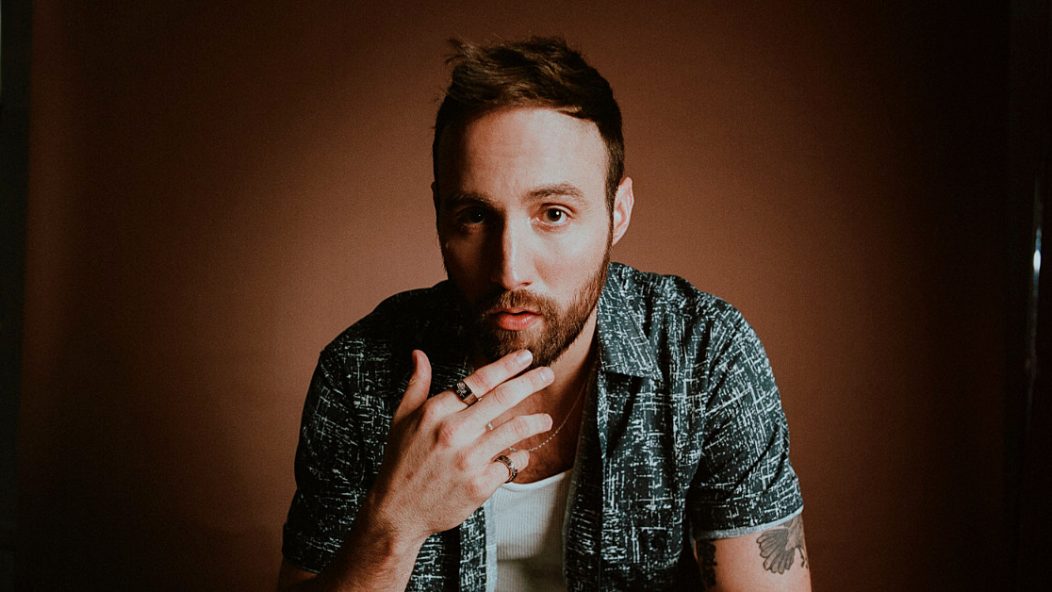
Ruston Kelly’s The Weakness is his most “dirt emo” album yet
It’s not every day someone invents a new genre. But when Ruston Kelly described his music “dirt emo,” it felt right. Sure, he lived in Nashville and dabbled with what some might call alt-country, but flickers of his emo roots surfaced through all of his songs.
On Kelly’s most recent album, The Weakness (due April 7), he’s gone all in on the genre he now calls home. The raw, deeply emotional songs are reminiscent of the early days Dashboard Confessional mixed with a hint of alt-country classic John Doe — vulnerable musings about everything from his addiction to his divorce.
Read more: Every Incubus album ranked, from worst to best
Much like his music, in person, Kelly is an open book. The 34-year-old singer-songwriter looks more like a suburban skater boy all grown up than the man who wrote songs for Tim McGraw and was married to country superstar Kacey Musgraves.
“I didn’t have any genre-specific plans when I started,” Kelly tells AP. “I knew that I love the sound of steel guitar and I was writing songs that lended themselves to a kind of folk style.”
Kelly says because he was in Nashville it was easy to place his music “into the blanket of Americana.” He was surprised when the first artists to reach out to him were all from the alternative scene.
Taking Back Sunday’s frontman Adam Lazarra tweeted that Dying Star was sick, Dashboard’s frontman Chris Carrabba was another early listener, and Max Bemis from Say Anything started following him on Twitter.
“I’m in Nashville and kind of considered this country guy, but the artists that are fans of my music are the ones that I grew up listening to in a completely different world,” Kelly continues.
Now, Kelly explains, his fan base has extended to both worlds: an amalgamation of goth fans sporting lip rings and dudes in cowboy hats.
Like Kelly, many of the artists coming out of Nashville are just as fluid. Annie DiRusso (who Kelly is bringing on tour) and Samia are crafting what Kelly calls a “new sense of what alternative can be.”
“Nashville is — say what you want about the quality of music in the mainstream — but one thing I learned about the town is song is king. There’s a reverence to a fucking good song. It doesn’t matter if someone works for Luke Combs or Morgan Wallen. You play a song in front of people in Nashville, and it’s a good song from a craft perspective, 90% of the time it’s very understood that you did your craft well, even if they’re not in the same genre.”
Kelly, who was born in 1988, came to Nashville at 18 for a music business program at Belmont University, which he attended “briefly” before “entering a very experimental phase.”
“I didn’t come to Nashville to do music,” Kelly admits. Instead, he moved because his sister — who’s now a member of Dashboard — lived in the area. “It was a free place to stay,” he jokes.

[Photo by Alysse Gafkjen]
His sister isn’t the only musical member of their family. Kelly produced his father Tim Kelly’s debut album in November 2021. His dad’s country crooning sounds remarkably like his son’s, and he even toured with his pedal steel guitarist, supporting his last two albums.
The younger Kelly quickly realized college wasn’t for him after he “ended up doing a bunch of acid” and spent most of his time writing songs and skipping class.
Although he had been in the southern city for over a decade, to make The Weakness, he had to leave.
First, his friend John Carter Cash invited him to move into a bungalow in the Virginia mountains that previously belonged to Maybelle Carter.
Then, in July 2020, he announced his split from Musgraves. A month later, he moved to the tiny Tennessee town of Portland (population: 13,341) to make music in an old Victorian house he bought to restore.
During the pandemic, he escaped to the small town that’s 40 miles northeast of Nashville, right by the Kentucky border. And while he “didn’t necessarily move away to write a record” he does feel the shift helped him figure out who he was and find “the foundation of what makes me me.”
Leaving Nashville wasn’t just about the music — it also allowed him to “totally and fully take on the task of getting to know myself better,” which he thinks “lended itself to making a record that is the most me that I’ve ever made.”
The Weakness is certainly far more “dirt emo” than its predecessors; hints of country remain, but there’s something deeply moving about the music he created in isolation. Kelly agrees. “If there’s any record that’s describing the sound that I feel like I’m creating, it’s this record.”
Making music in semi-isolation proved to be a healing experience, with Kelly saying, “I feel like if making a record isn’t therapeutic to me to any degree that I’m not doing it right.”
That’s always been his intention with songwriting. “It started with what if I was bullied at school, or some girl didn’t give a shit about me putting flowers in her locker. I was a bit of a romantic.” He was, admittedly, “extremely emo.”
When it came to tackling his extremely high-profile divorce from Musgraves on the album, it took time to reflect on the public dissolution of their marriage. While he usually finds it easy to write about the issues he’s faced — including his addiction — he had trouble finding the words to tackle what he calls “the most personally difficult thing I’ve ever been through in my life” at first.
“I’m an addict. I’ve gone through many relapses and many withdrawals, against my better judgment, and against me wanting to be better, and I just couldn’t,” Kelly remembers.
“Those things were so difficult, but they were so easy to write about. I felt very fluid about being vulnerable with that, and knowing that there are millions of other people that deal with that. When it came to my divorce, it was too hard to write about. I wasn’t able to write about it.”
Instead, he focused on other topics, making the decision to “let it come to me when I needed it too.” “There are a few songs that specifically deal with it on the record,” Kelly admits.
The honest “Mending Song” particularly stands out to listeners. Kelly sings, “My marriage ended and I moved up north to mend/I tried to fight it like a needle in my skin/The hole inside me kept on growin’/Everything went black.”
On the album’s standout title track, he grapples with wanting to return to what hurt him, singing, “I woke up dreaming of her face again/I hate the way I miss her torment/I’ve come this far I know I can’t forget/We don’t give in to the weakness.”
Those songs only came about after he had “a bit of time to process” his divorce, which was a first for the prolific songwriter. “As a writer, I’ve always been able to be like, ‘Damn, that hurts when we write about it,’ but this one felt like, ‘Damn, I can’t even pick up the pen because there’s too much.’”
In the end, he says, “I was able to, in the spirit of growth, get to know myself better and not numb myself with drugs to deal with it.”
He took a contemplative approach to dealing with the divorce lyrically because he didn’t want to regret what he said. He wanted to write lyrics that “had honor” that he would be proud to sing 20 years later, instead of “writing from the raw emotion of it.”
Still, The Weakness is far from a divorce album — instead, he reflects on the isolation many of us felt during the pandemic, learning to heal, and even jokes around.
One particularly cheeky new song is “Michael Keaton,” where he reflects on taking CBD and quickly realizing it was actually Delta-8. After sharing an Instagram post about the experience, his fans chimed in with similar stories — including a priest who accidentally indulged before his sermon. “I couldn’t believe it — literally every comment was ‘This happened to me,” Kelly laughs. “I would’ve loved to be at that sermon.”
While The Weakness is extremely original, Kelly’s a sucker for a cover.
In October 2019, he released Dirt Emo: Vol. 1, a cover album with songs by Dashboard, blink-182, My Chemical Romance and more. After Carrabba reached out, the two teamed up on “Screaming Infidelities.”
“He’s one of those guys that doesn’t realize how important his musical contribution is,” Kelly says of the Dashboard bandleader. “You run into a lot of people in this business that think very highly of themselves, because a lot of people tell them that they’re larger than life, but he’s one of those people that’s just quietly amazing.”
Luckily for fans of Dirt Emo Vol. 1, he has plans to release future installments.
He still wants to record versions Green Day’s “Basket Case,” Motion City Soundtrack’s “Let’s Get Fucked Up and Die,” Dashboard’s “The Sharp Hint of New Tears” and a Taylor Swift song.
After all, Kelly covered Swift’s “All Too Well” and says these days, “That girl is dirt emo.” He names Pinegrove as another standout.
And he would know — after all, he did invent the genre.










